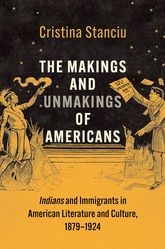 The Makings and Unmakings of Americans: Indians and Immigrants in American Literature and Culture, 1879-1924
The Makings and Unmakings of Americans: Indians and Immigrants in American Literature and Culture, 1879-1924
Contents
-
-
-
-
-
-
-
-
-
-
-
Nationalism on Celluloid: Silent Film, Education, and Patriotism Nationalism on Celluloid: Silent Film, Education, and Patriotism
-
Industrial and Educational Film: Americanization at Ford Motor and Beyond Industrial and Educational Film: Americanization at Ford Motor and Beyond
-
Americanism in Action: Motion Pictures and Americanization Efforts Americanism in Action: Motion Pictures and Americanization Efforts
-
Case Studies Case Studies
-
Alice Guy Blaché’s Making an American Citizen (1912) Alice Guy Blaché’s Making an American Citizen (1912)
-
Charles Chaplin’s The Immigrant (1917) Charles Chaplin’s The Immigrant (1917)
-
-
-
-
-
-
7 Spectacular Nationalism: Immigrants on the Silver Screen, Americanization, and the Picture Show
Get access-
Published:January 2023
Cite
Abstract
This chapter asks: what cultural work did silent film do for Americanization, the active and sometimes coercive campaign to make new immigrants into good Americans? It argues that, just as Americanization did not produce compliant citizens overnight, silent film as a powerful new medium of persuasion influenced American viewers' transformation only in part. The chapter particularly focuses on the use of film in industrial and educational contexts, which sometimes overlapped, purporting to both “educate” and Americanize the new immigrants to the United States, particularly immigrant workers. Delving into the author's chosen films as case studies, the chapter illustrates the potential of silent film as both mimesis (or representation of ideology) and as ideology. It seeks to answer the following questions: How did silent film contribute to the mission of Americanization? Were new immigrants the innocent viewers that the American government, industrialists (like Henry Ford), and Progressive Era educators and Americanizers were imagining for immigrant children and their families? Were they complicit? Were they doubly exploited through the popular images that aimed to “represent” them and in their own uncritical reception of such films, duped by the illusion of the medium? To answer these questions, the chapter draws on scholarship in Immigration Studies and Film Studies, as well as archival materials in the National Archives, the Library of Congress (MBRS), Northeast Historic Film, and the New York Public Library.
Sign in
Personal account
- Sign in with email/username & password
- Get email alerts
- Save searches
- Purchase content
- Activate your purchase/trial code
- Add your ORCID iD
Purchase
Our books are available by subscription or purchase to libraries and institutions.
Purchasing information| Month: | Total Views: |
|---|---|
| August 2024 | 1 |
| September 2024 | 1 |
| December 2024 | 1 |
| May 2025 | 1 |



Get help with access
Institutional access
Access to content on Oxford Academic is often provided through institutional subscriptions and purchases. If you are a member of an institution with an active account, you may be able to access content in one of the following ways:
IP based access
Typically, access is provided across an institutional network to a range of IP addresses. This authentication occurs automatically, and it is not possible to sign out of an IP authenticated account.
Sign in through your institution
Choose this option to get remote access when outside your institution. Shibboleth/Open Athens technology is used to provide single sign-on between your institution’s website and Oxford Academic.
If your institution is not listed or you cannot sign in to your institution’s website, please contact your librarian or administrator.
Sign in with a library card
Enter your library card number to sign in. If you cannot sign in, please contact your librarian.
Society Members
Society member access to a journal is achieved in one of the following ways:
Sign in through society site
Many societies offer single sign-on between the society website and Oxford Academic. If you see ‘Sign in through society site’ in the sign in pane within a journal:
If you do not have a society account or have forgotten your username or password, please contact your society.
Sign in using a personal account
Some societies use Oxford Academic personal accounts to provide access to their members. See below.
Personal account
A personal account can be used to get email alerts, save searches, purchase content, and activate subscriptions.
Some societies use Oxford Academic personal accounts to provide access to their members.
Viewing your signed in accounts
Click the account icon in the top right to:
Signed in but can't access content
Oxford Academic is home to a wide variety of products. The institutional subscription may not cover the content that you are trying to access. If you believe you should have access to that content, please contact your librarian.
Institutional account management
For librarians and administrators, your personal account also provides access to institutional account management. Here you will find options to view and activate subscriptions, manage institutional settings and access options, access usage statistics, and more.